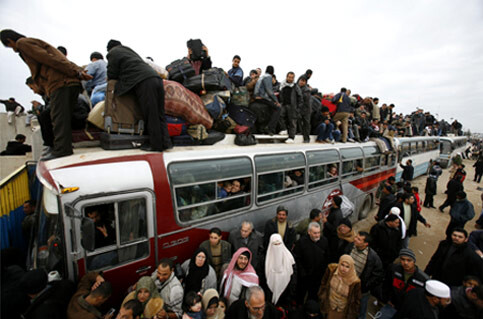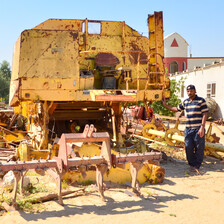The Electronic Intifada 23 May 2007

The Rafah Crossing has been closed for nine days. When it is sporadically opened, masses of Palestinians rush to pass through. (Asmaa Waguih/IRIN)
JERUSALEM, 23 May 2007 (IRIN) - As Israeli operations against suspected Palestinian militants in the Gaza Strip increase and internal violence wanes, some humanitarian organisations are resuming work in the troubled enclave which remains closed off from the rest of the world.
The Rafah Crossing, the only crossing to destinations outside Israel, has been closed for over a week. The other crossings lead to Israel, and most Palestinians from Gaza, barring exceptional humanitarian cases, are not able to obtain the requisite permits.
“The crossing has been closed for nine days now,” said Maria Telleria from the European Union Border Assistance Mission, which helps monitor Rafah Crossing.
Dr Mona el-Farra who works in a hospital in the northern Gaza Strip says the closure of crossing points is affecting patients. “One cancer patient, from Nusseirat refugee camp, has been waiting for 47 days to be referred to a hospital outside Gaza,” she said.
The current operation in Gaza is “a response to the endless rocket fire”, say Israeli military sources. The military says it “will continue to operate against the terror organisations in order to ensure the security and safety of the citizens of Israel”.
Israeli military action
The Israeli military conducted on Wednesday its first land operation inside the Gaza Strip since November 2006, although some troops moved in for “observation” purposes last week. Some seven people in Khan Younis in southern Gaza were detained and later released, according to the Israeli army.
Since the start of Israel’s renewed military action last week, 37 people, including seven children, have been killed, according to UN Office for the Coordination of Humanitarian Assistance (OCHA), nearly all in airstrikes.
The Israeli military says that in the last week some 190 home-made rockets were fired into southern Israel by Palestinian militants. One Israeli woman was killed and others were wounded.
Call to cut off water to Gaza
As the army steps up operations, former Israeli Prime Minister and current leader of the opposition Benyamin Netanyahu has called for Israel to cut water and electricity to Gaza, prompting concern from Palestinians and protests from rights groups.
The Israeli group B’tselem said “intentionally harming civilian infrastructure constitutes prohibited collective punishment and could also constitute a war crime”. It added that last summer Israel hit Gaza’s only power plant causing severe power outages.
The effects of that bombing are still felt today, say aid workers.
“Tense” situation as aid resumes
The latest military campaign comes on the heels of a ceasefire agreement between the rival Palestinian factions Fatah and Hamas, after some 55 people were killed in what is being seen as the worst internal violence to hit the Gaza Strip.
“The situation remains tense,” said el-Farra from northern Gaza who continues to monitor the situation.
However, this week violence has ended, as the ceasefire is holding, and aid groups are back at work.
“We have returned to full duty,” said John Ging, of the United Nations Relief and Works Agency (UNRWA), who is in charge of the agency’s Gaza work. “We never stopped operations, although some were interrupted by the infighting. We continued to give services in areas outside of the crossfire zones.”
UNRWA currently gives aid to about 800,000 Palestinian refugees in the Gaza Strip.
Some NGOs have also resumed operations.
“We are back to regular work in Gaza, delivering food, vegetables and doing water rehabilitation,” said Liz Sime, country director for CARE International.
Increased requests for aid
Both she and Duncan McLean, from Medicine Sans Frontieres, have noted increased requests for aid recently, particularly medical disposables.
“There is a significant increase in requests for emergency donations, including bandages and syringes. These requests come from the [Palestinian] Ministry of Health and hospitals,” said McLean.
“The hospitals are simply overwhelmed,” said el-Farra.
She blamed the internal clashes, the Israeli-Palestinian violence and the international sanctions on the Palestinian Authority imposed after the Islamist party Hamas came to power after last year’s election, for the current state of the health sector.
Movement restrictions
One of the hardest hit places since the Israeli re-entry into the Strip, is the Saefa area in the northwest section of the Gaza Strip. There, some 200 people have been subject to severe restrictions on their movement, after the Israeli military set up a position and took over Palestinian homes.
“The soldiers are in our house,” said Yasir, from Saefa, who has taken up residence in another home. “We haven’t had access to our farmland in three days. This whole area has been closed off.”
With the looming possibility of a large-scale incursion into the Gaza Strip, UNRWA’s Ging hopes “the cycle of violence will be broken, because people here have suffered far too much”.
Since the start of the year, over 150 Palestinians have died in the internecine fighting.
This item comes to you via IRIN, a UN humanitarian news and information service, but may not necessarily reflect the views of the United Nations or its agencies. All IRIN material may be reposted or reprinted free-of-charge; refer to the copyright page for conditions of use. IRIN is a project of the UN Office for the Coordination of Humanitarian Affairs.
Related Links


